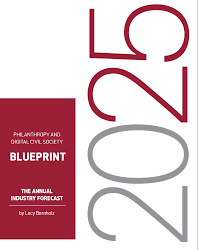in Beshara Magazine…We talk to Leonora Grcheva of the Doughnut Economics Action Lab about how Kate Raworth’s innovative economic theory is being translated into sustainable practice in cities and regions across the world.
Philanthropy and digital civil society: Blueprint 2025
by Lucy Bernholz in Blueprint 2025…Philanthropy and Digital Civil Society: Blueprint is an annual industry forecast about the ways we use private resources for public benefit in the digital age. Each year, the Blueprint provides an overview of the current landscape, points to big ideas that matter, and directs your attention to horizons where you can expect some important breakthroughs in the coming year.
Futures Lab
in Futures Lab report in Horizon 2045…We look for evidence of the future that’s coming and in some cases is already here.
From risk to resilience: Wildfires and the insurance industry’s climate reckoning
Doug Parsons interviews Dr. Carolyn Kousky in America Adapts the Climate Change Podcast…Carolyn shares insights on how the industry can respond to these challenges by closing protection gaps, incentivizing resilience, and creating innovative solutions to build more climate-resilient communities. It’s a timely and critical conversation at the intersection of insurance, wildfires, and the future of climate adaptation.
China’s ageing population: A demographic crisis is unfolding for Xi
by Laura Bicker in BBC…Over the next decade, about 300 million people, who are currently aged 50 to 60, are set to leave the Chinese workforce. This is the country’s largest age group, nearly equivalent to the size of the US population.
Anthropocene under dark skies: The compounding effects of nuclear winter and overstepped planetary boundaries
by Florian Jehn in EGU…The analysis of global catastrophic events often occurs in isolation, simplifying their study. In reality, risks cascade and interact.
Climate models can’t explain what’s happening to Earth
by Zoë Schlanger in The Atlantic…Global warming is moving faster than the best models can keep a handle on.
Strategy 2030 mid-term review and forecast
by Solferino Academy…“We are too often still operating from fixed mindsets and with fixed responses rather than recognising the interconnected nature of issues we are facing”
Reasons for hope in 2025
by Suzette Brooks Masters in Fulcrum…My way of not giving in to despair and apathy amid all this uncertainty is to look for sources of hope, to find in uncertainty itself reasons for hope. Happily, once you look for the places where hope and imagination live, you find it in ample supply. As part of the research I conducted for Democracy Funders Network’s Imagining Better Futures for American Democracy report, I talked to dozens of visionaries who were imagining and creating new and better ways of being with one another, with nature, with technology, and with the planet. The final section of that paper, titled Inspiration, is my curated compilation of examples of what better futures could look like in real life and in the imagination. Whenever I feel the pull of pessimism, I turn back to those examples.
The incredible, world-altering ‘Black Swan’ events that could upend life in 2025
From Politico Magazine…15 futurists, foreign policy analysts and other prognosticators provide some explosive potential scenarios for the new year.





